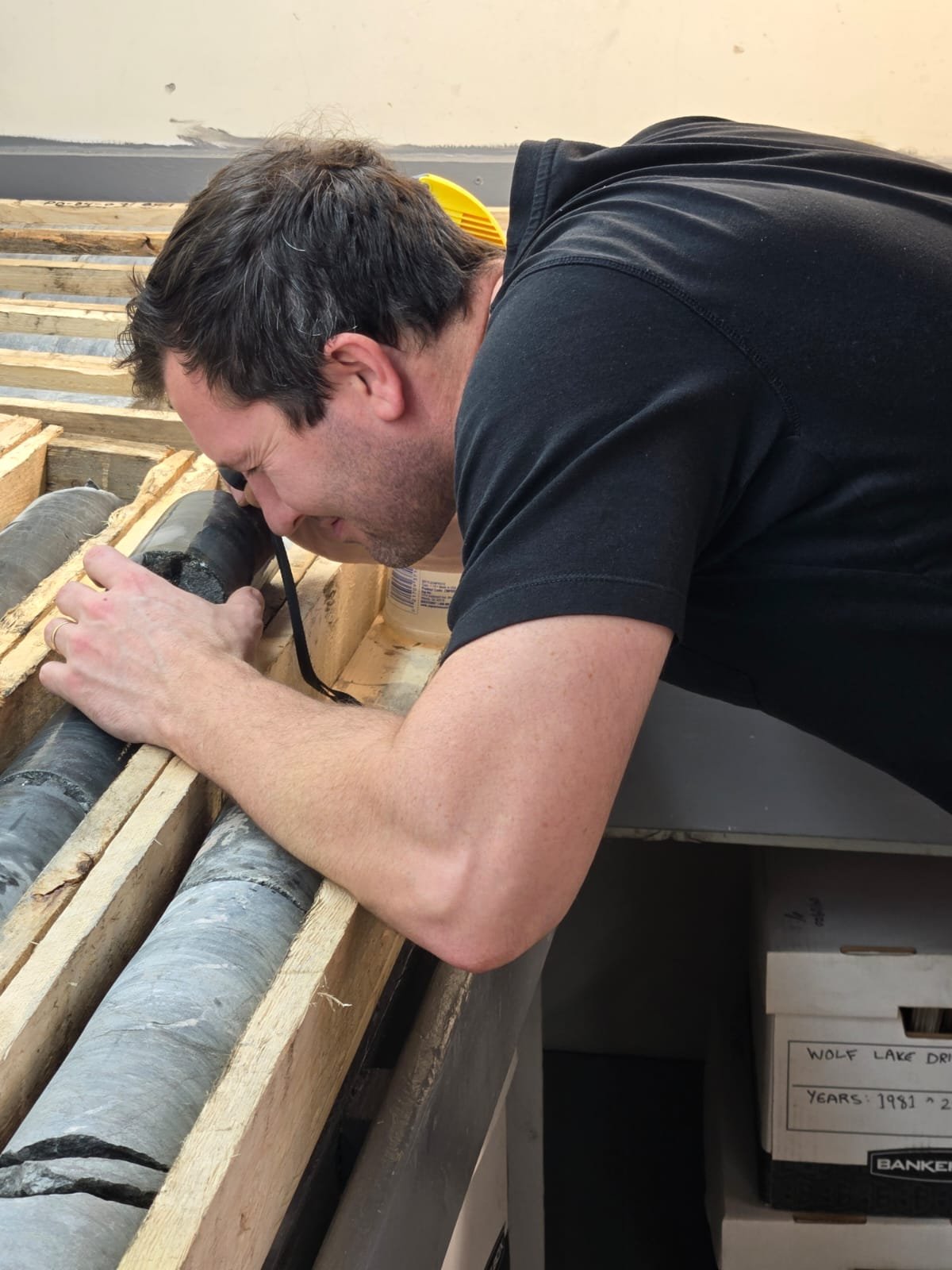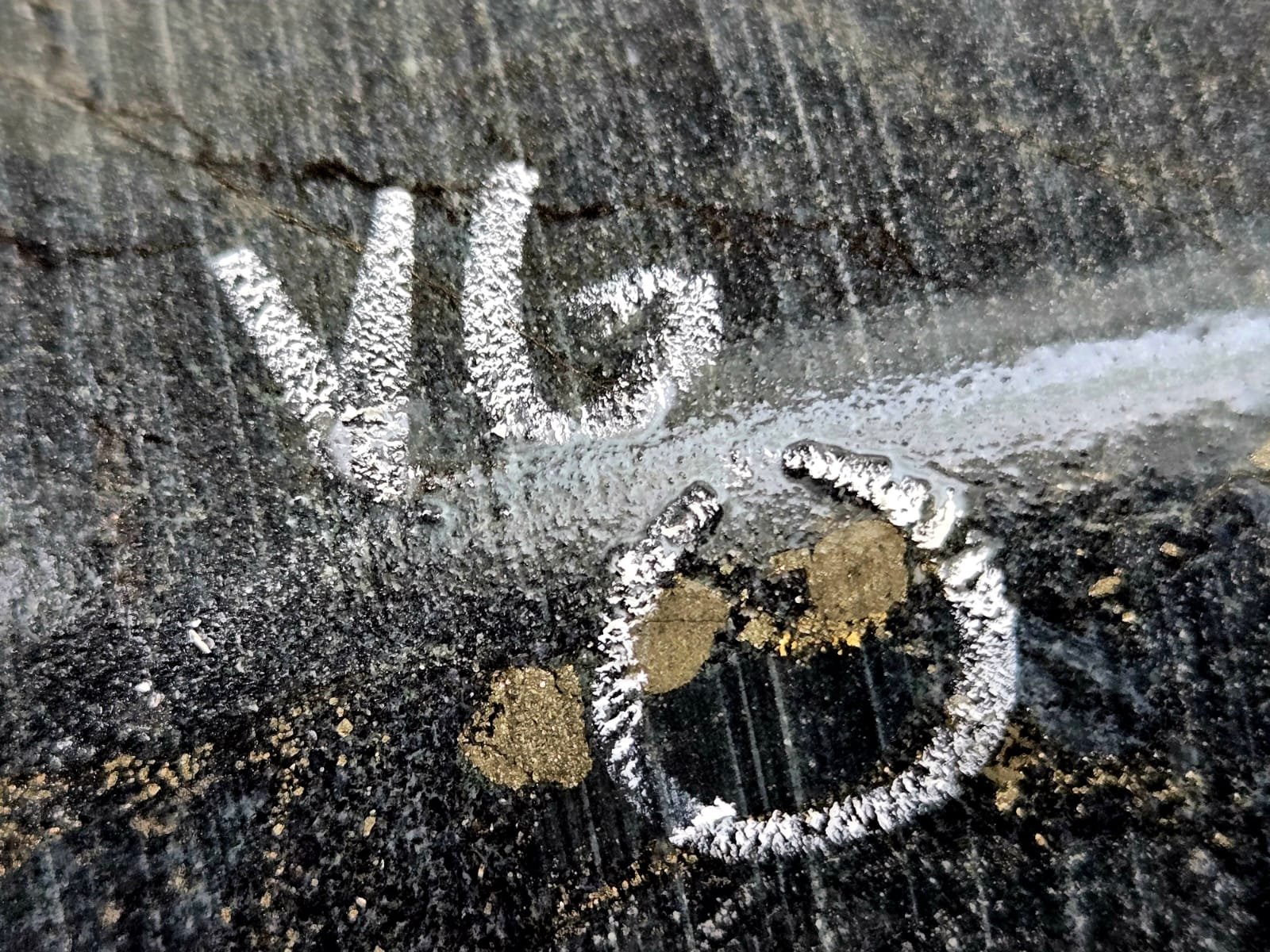Digging in at Pardo
AN ADVANCED NEAR SURFACE PALEOPLACER GOLD PROJECT NEAR SUDBURY, ONTARIO
Pardo Gold Project – 2025 Is a Breakout Year
Following a successful Phase 1 drill program completed in early 2025, Inventus has launched an aggressive new campaign at the Pardo Gold Project, focused on unlocking the value of its near-surface, high-grade gold mineralization. The 2025 program includes a 45,000-tonne bulk sampling initiative alongside a Phase 2 resource drill program to advance Pardo toward a maiden resource.
Since May, our team has been executing a detailed grade control drill program to define the initial 15,000 tonnes of bulk sample material, with mineralization starting just 6 metres below surface. Results so far have been strong, including a weighted average and thickness of 4.10 gpt gold and 1.78 metres for the Trench 1 bulk sample site and 3.84 gpt gold and 1.82 metres for the 007 North bulk sample site, confirming the continuity and quality of the gold-bearing conglomerates.
McEwen Mining and Eric Sprott Funding
A milling agreement with McEwen Mining was signed in July, securing access to the Stock Mill near Timmins to begin processing the bulk sample later this summer. This milestone follows a major vote of confidence from both McEwen Mining and Eric Sprott, who contributed a combined $1.83 million in funding through early warrant exercise and a flow-through private placement.
With drilling, bulk sample extraction and processing all underway, 2025 marks a pivotal year for Inventus as we highlight the potential of the Pardo Gold Project.
A look at the new core offering a glimpse at the intersections of the mineralized gold reef from the Phase 1 Drilling Program



Pardo is Getting Noticed
Rob McEwen, the visionary founder of Goldcorp, reveals why he’s intrigued by Inventus Mining's Pardo Gold Project, citing its extensive, close-to-surface gold mineralization, easy-to-mine potential reminiscent of South Africa’s Witwatersrand, and remarkable sampling results, including 1 oz per tonne gold.
Field Footage
A quick walk through showing the drill core that had just been taken out of the ground
What Lies Beneath
Our drilling continues unabated in this Winter Wonderland near Sudbury
Location and Access
The Pardo Gold Project is located in Ontario, Canada, 65 km north east of the world class mining district of Sudbury. The property has excellent year round access by road, which is less then 1.5 hours from Sudbury.
Sudbury A Strategic Mining Hub
The Pardo project strongly benefits from its proximity to Sudbury, a global mining hub, with advanced infrastructure, supply chains and a legacy of global mining expertise.
Pardo Exploration Target
Exploration at the Pardo project is targeting a near surface gold-bearing conglomerate reef . The conglomerate “reef” is extensive, flat lying and ranges from 1 to 4 metres thick. The conglomerate, if economically feasible, would be subject to low-cost surface and underground room and pilar mining methods.
A 2018 Technical report on Pardo outlined three exploration target ranges for the gold-bearing conglomerate based on the limited exploration work conducted so far. The scenarios were generated in terms of pessimistic (P10), moderate (P50) and optimistic (P90). see table below.
*The potential tonnages and grades are conceptual in nature and are based on surface mapping, drilling and channel sampling results that define the approximate thickness, extent and grade of the mineralized conglomerate unit. Currently there has been insufficient exploration to define a mineral resource.
Modelled extent of conglomerate reef with grade shells
Modelled extent of conglomerate reef
Bulk Sampling
Inventus conducted the first phase (5,000 tonnes) of a 50,000 tonne advanced exploration bulk sampling program at Pardo in 2022. The bulk sample program has built confidence of the gold grade and is paving the way for a maiden resource estimate on the property.
In late 2017, Inventus conducted its first bulk sample from the Trench 1 occurrence. The 1,000 tonne bulk sample was calculated to contain 133.8 ounces of gold, equivalent to a head grade of 4.2 g/t gold. Diamond drilling prior to extraction of the bulk sample returned a predicted block model grade of 1.55 g/t gold.
The 2022 Bulk Sample Program at the 007 Zone
007 Zone
36.5 g/t gold over 31 m (channel sample)
7.9 g/t gold over 2.25 m; Including 21.2 g/t gold over 0.78 m (drill hole)
13.4 g/t gold over 1.93 m; Including 62 g/t gold over 0.3 m (drill hole)
9.5 g/t gold over 2.0 m; Including 29.2 g/t gold over 0.6 m (drill hole)
Pardo Exploration Highlights
HGZ Zone
11.5 g/t gold over 3.2 m (drill hole)Including 58.2 g/t gold over 0.6 m (drill hole)
9.8 g/t gold over 3.5 m; Including 47.1 g/t gold over 0.7 m (drill hole)
4.7 g/t gold over 2.18 m; Including 15.5 g/t gold over 0.63 m (drill hole)
Trench 1
4.2 g/t gold in 1,000 tonne bulk sample
4.1 g/t gold over 2.17 m; including 15 g/t gold over 0.55 m (drill hole)
6.4 g/t gold over 2 m; including 20.2 g/t gold over 0.5 m (channel sample)
Trench 2
10.2 g/t gold over 5.5 m; including 47.9 g/t gold over 1.0 m (channel sample)
11.8 g/t gold over 2.0 m; including 22.6 g/t gold over 1.0 m (channel sample)
9.4 g/t gold over 2.5 m; including 0.5 m of 26.4 g/t gold over 0.5 m (channel sample
Eastern Reef
4.2 g/t gold over 92.5 m (channel sample)
Godzilla Zone
5.2 g/t gold over 140 m (channel Sample)
Pardo Project - NI 43-101 Technical Report 2018
3D Pardo Model in Leapfrog®
Geostatistical Review and Drillhole Spacing Analysis
Geology
The Pardo Project is a conglomerate-hosted gold system within rocks of the Huronian Supergroup, a 2.4 billion year old sedimentary basin. Ancient Precambrian Sedimentary basins such as the Huronian are known to contain large paleoplacer gold deposits. One such setting is the famous Witwatersrand basin in South Africa, which is the largest gold provenance in the world, having produced over 1,500 million ounces of gold.
Huronian Basin, Ontario (left) Compared to the Witwatersrand Basin, South Africa (Right)
Inventus has identified gold bearing conglomerate reefs within two separate formations. The conglomerate reefs are extensive, flat lying layers ranging from 1 to 4 metres thick. In some areas these reefs are stacked and separated by interbedded sandstone. The basal Matinenda Formation is composed of pyritic quartz pebble conglomerate and underlies the Mississagi Formation, a polymictic cobble to boulder conglomerate. The two formations contain anomalous gold values over the entire property that spans 13 km north-south and 3 to 5 km east-west.
Gold-bearing conglomerate of the Mississagi Formation at the Godzilla Zone.
Gold-bearing Conglomerate of the Mississagi Formation at the Godzilla Zone.
Academic Research on the Pardo Paleoplacer
“The discovery of basal and intraformational conglomerate-hosted gold mineralization in the Huronian Supergroup’s Mississagi Formation near Sudbury, Ontario, has indicated potential for Witwatersrand-type gold mineralization”









